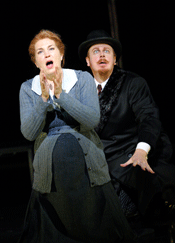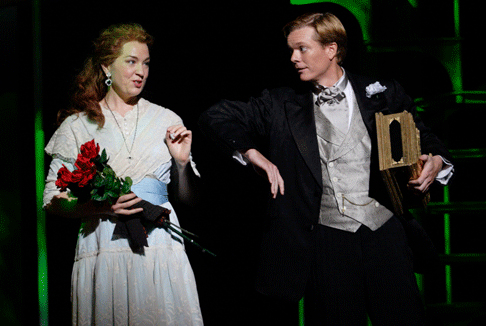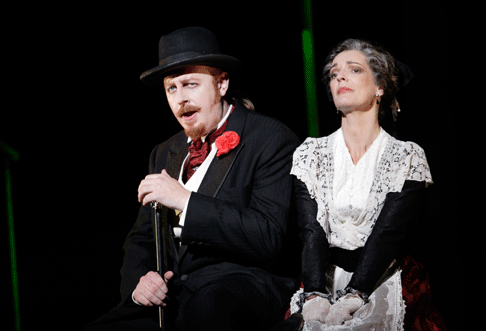ENO has entrusted its new production to Des McAnuff, best-known in London
for the musical Jersey Boys which is currently enjoying a long run at the
Prince Edward Theatre. The only toe he has thus far dipped in the operatic
water was a production of Wozzeck in San Diego last year — not a
piece that would come automatically to mind for a novice opera director. An
eclectic history, promising more than some of the guest directors engaged by
ENO in the recent past. McAnuff fixes the starting point of the opera in a WW2
atomic bomb laboratory. It is easy to believe how an ageing scientist would be
left feeling unfulfilled after devoting his life and career to an inherently
cold-blooded and inhuman vocation.
Faust’s reversion to youth appears to take him back to the early days
of WW1 — though a few obviously intentional anachronisms make the period
somewhat indistinct — and initially it is a romanticised vision of jolly
carousing soldiers with their girls in dirndl skirts and flouncy blouses. The
love scene is idealised even further, with intense coloured lighting, and
flowers appearing to spring up at will on the projected backdrop. From that
point forwards the scales start to fall from Faust’s eyes and time seems
to be sped up; the colour is blanched from the scene, Marguerite seems to age
several years in the few months that elapse between Acts 3 and 4, and even more
between then and the final scene. The perky soldiers of the Act 2 tavern scene
are almost unrecognisable when they return from duty, old and bent and going
crazy with shell-shock.
 Melody Moore and Iain Paterson
Melody Moore and Iain Paterson
In the title role, Toby Spence was a revelation. His attractive stage
presence, clarity of delivery and impeccable diction have never been in
question, but Faust is a fuller lyric role than Spence has been used to, and I
feared his voice may simply be swamped by the orchestra or vanish into the
further reaches of the Coliseum’s vast auditorium. But in the event, the
fullness of his sound at the very beginning had me worried that he might be
over-singing, and I was relieved when the sound seemed to settle down, easily
big enough for the occasion but retaining his trademark bright, youthful sound,
right up to a splendidly confident high C in ‘Salut, demeure’. It
is not the most flexible or nuanced sound, nor does it sound French —
I’m not sure it’s possible to when singing in English translation
— but it was confident, romantic and hugely enjoyable.
Iain Paterson was a congenial Mephistopheles, more gentleman than devil I
felt, and he’s got the stage presence for the role. Although his lowest
notes lack power (he’s a bass-baritone rather than a bass) he turned in
an exceptionally stylish vocal performance.
 Melody Moore and Toby Spence
Melody Moore and Toby Spence
The American soprano Melody Moore made a disappointing first impression as
Marguerite (rendered in the surtitles as Margarita, though the principals
seemed to be approximating the French pronunciation); there is something
invulnerable and unyielding about her vocal quality which makes her difficult
to engage with, and she made hard work of the Jewel Song. She did come into her
own in the final scene, where the same qualities that had earlier been
frustrating made for an effectively steadfast ‘Anges purs’.
Benedict Nelson’s Valentin was secure and simply effective in
‘Avant de quitter ces lieux’, and Anna Grevelius’s charmingly
androgynous Siebel was beautifully-sung.
 Iain Paterson and Pamela Helen Stephen
Iain Paterson and Pamela Helen Stephen
Ed Gardner struck the right balance with the score, neither too heavy-handed
in the rhythmic numbers nor too over-indulgent in the lyrical ones. Only
‘Le veau d’or’ didn’t quite have the drive to take
flight.
McAnuff’s production worked for me for the most part, though it was
disappointing that he opted to cut the Walpurgisnacht ballet altogether —
all that remained of the scene was an episode in which Mephistopheles shows
Faust a group of tortured souls writhing round a table. If going down the
historically-informed opera ballet route doesn’t appeal (and frankly, why
would it?) surely the ballet is the greatest opportunity for a director and his
choreographer to add to the audience’s understanding, or to crystallize
their production concept in the form of a vignette?
At the end, with Marguerite redeemed and Faust dragged down by
Mephistopheles through a Don Giovanni-style trapdoor, we see the elderly Faust
appearing in his laboratory, collapsing after apparently having drained the cup
of poison from the start of the opera. Was his whole adventure into youth and
corruption, then, just the hallucination of a poisoned and dying man? The
elixir of youth to which Mephistopheles transforms Faust’s deadly draught
is poison of one sort or another, whether its effect be physical or moral, and
either way, Faust ends up back where he started.
Ruth Elleson © 2010



